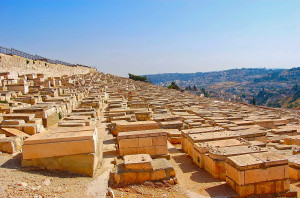Jerusalem’s Mount of Olives has been important to Christians since the first century. Jesus met with his disciples among its olive trees, prayed with them near its base at Gethsemane and ascended to heaven from its peak near Bethany, sites all now marked by churches. For even longer, the Mount of Olives has been important to many Jews, who still seek to be buried along its slope.
The Mount of Olives lies across the Kidron Valley from the eastern wall of the Temple Mount. According to Jewish tradition, the Messiah will signal his arrival by coming down the Mount of Olives, crossing the Kidron Valley and entering the Temple through the eastern wall’s Golden Gate. When Jesus followed this path riding a donkey, he was welcomed as the Messiah by followers waving palm branches. Rabbi Irving Greenberg famously said in 1967 that the difference between Jews and Christians will finally be settled when the Messiah descends the Mount of Olives and announces whether it his first or second trip.
To the left of the path modern visitors take down the Mount of Olives is an ancient cemetery, containing about 70,000 tombs from the time of King Solomon’s Temple to the present. For thousands of years, Jews desiring a ring side seat for the Messiah’s arrival have been interred along the Mount of Olives’ western slope. They believe, like other Jews and Christians, that the Messiah’s appearance (first or second) will initiate the bodily resurrection of the dead. Consequently, they are buried with their feet to the east to be able to greet the Messiah face to face as they arise from their tombs. In the meantime, people pay their respects by placing small rocks on the stone tomb covers, reflecting their belief that the entombed souls are eternal.
A single grave site on the Mount of Olives reportedly costs up to $85,000. For those who can’t afford to await the Messiah from there, there may be no reason to worry. An ancient legend says believers from around the world will be able to tunnel to the Mount of Olives when the Messiah arrives.
